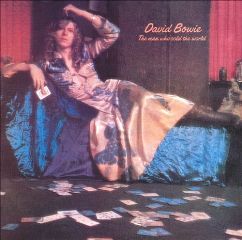David Bowie - The Man Who Sold the World (1970)
David Bowie - The Man Who Sold the World (1970)

A1 The Width Of A Circle 8:07 A2 All The Madmen 5:38 A3 Black Country Rock 3:33 A4 After All 3:52 B1 Running Gun Blues 3:12 B2 Saviour Machine 4:27 B3 She Shook Me Cold 4:13 B4 The Man Who Sold The World 3:58 B5 The Supermen 3:39 David Bowie – vocals, guitar Mick Ronson – guitar Ralph Mace – synthesizer Tony Visconti – bass Mick Woodmansey – drums
Even though it contained no hits, The Man Who Sold the World, for most intents and purposes, is the beginning of David Bowie's classic period. Working with guitarist Mick Ronson and producer Tony Visconti for the first time, Bowie developed a tight, twisted heavy guitar rock that appears simple on the surface but sounds more gnarled upon each listen. The mix is off-center, with the fuzz-bass dominating the compressed, razor-thin guitars and Bowie's strangled, affected voice. The sound of The Man Who Sold the World is odd, but the music is bizarre itself, with Bowie's bizarre, paranoid futuristic tales melded to Ronson's riffing and the band's relentless attack. Musically, there isn't much innovation on The Man Who Sold the World -- it is almost all hard blues-rock or psychedelic folk-rock -- but there's an unsettling edge to the band's performance, which makes the record one of Bowie's best albums. [Rykodisc's 1990 CD reissue includes four bonus tracks, including the previously unreleased "Lightning Frightening," and the single "Holy Holy," and both sides of the 1971 "Arnold Corns" single, "Moonage Daydream" and "Hang On to Yourself," which are early and inferior versions of songs that would later appear on Ziggy Stardust.] --- Stephen Thomas Erlewine, allmusic.com
Album, początkowo zatytułowany David Bowie a ostatecznie Man of Words, Man of Music jest hołdem złożonym wszystkim Londyńskim inspiracjom muzyka. Objawia już zalążki talentu kompozytorskiego swojego autora, talentu z którym świat tak naprawdę oswoi się dopiero w ciągu kilku następnych lat. Pierwsza płyta długogrająca Bowiego, "The Man Who Sold The World", od razu nagrywana była jako całość i stała się jednocześnie pierwszym prawdziwym wyzwaniem dla poszukiwaczy nowych przestrzeni dźwiękowych. Słyszane są na niej gitary Micka Robinsona często uznawane są za pierwsze w historii gitary heavymetalowe, a cały album określa się jako początek ery glam-rocka. Wydany przez wytwórnię Mercury w 1971 roku album jeszcze tego samego roku David promował podczas specjalnej trasy po Stanach Zjednoczonych. --- muzyka.onet.pl
download (mp3 @320 kbs):
Zmieniony (Niedziela, 14 Styczeń 2018 10:01)








